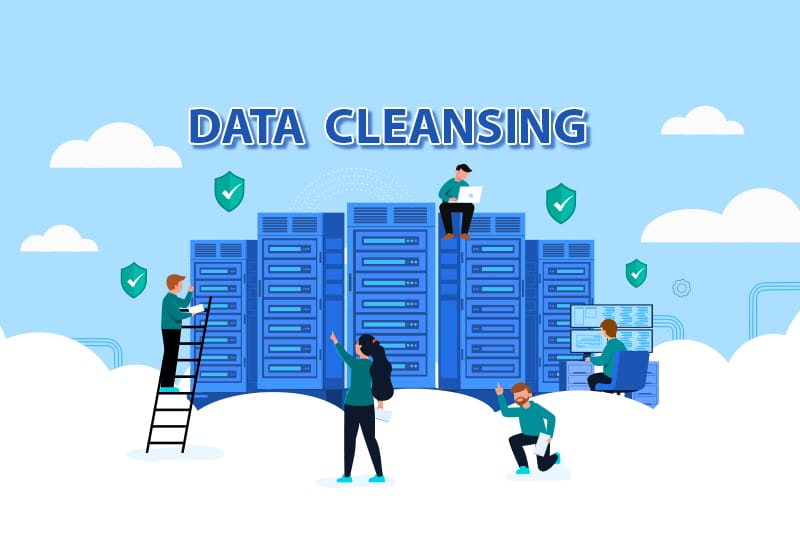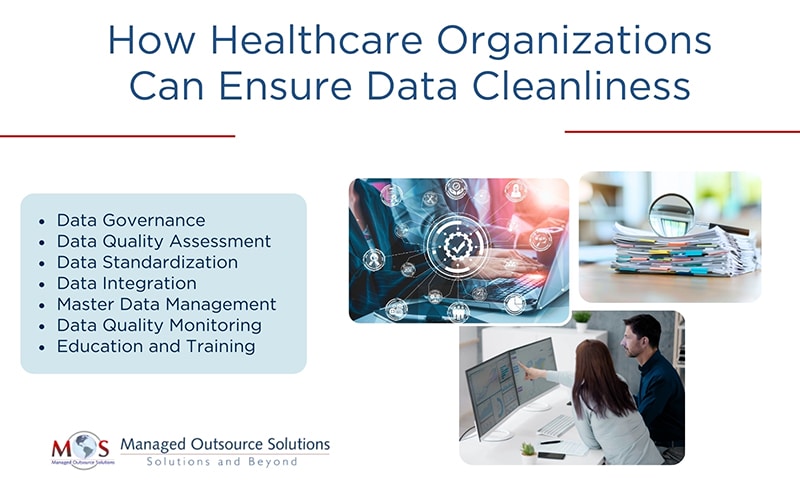Accurate and effective healthcare delivery depends heavily on patient records. Medical practitioners’ capacity to make decisions is compromised when these records are erroneous, out-of-date, or missing values, or when duplicate records confuse potentially important information. Data cleansing becomes crucial at this point. To guarantee accuracy and effectiveness in therapy and lower risk, it aims to standardize, validate, and correct patient data. By identifying and correcting errors, duplicates, or missing information, data cleansing services guarantee that healthcare institutions keep accurate, consistent, and error-free patient records. This ensures adherence to legal requirements, helps improve patient care, and strengthens decision-making.
Why Is Clean Data Crucial in Healthcare?
Clean data is essential for:
- Patient safety and care: Complete and accurate data guarantees that medical personnel have the right patient information. This affects patient care in general as well as diagnosis and therapy. For example, there may be serious repercussions if a patient’s allergies or prescriptions are not adequately documented.
- Monetary savings: On average, companies lose 15% to 25% of their revenue due to dirty data. This results in large financial losses. Scheduling appointments, billing, and patient matching are all made easier with clean data.
- Interoperability and More Effective Operations: Healthcare facilities may run more effectively and with less administrative strain when data is reliable and easily available.
- Improved Research and Analysis: Research and analysis depend on clean data. Accurate data is essential for researchers and healthcare analysts to spot patterns, examine results, and formulate suggestions based on solid evidence. To enhance public health services, governments use healthcare data. For example, good data is essential for designing healthcare infrastructure, tracking disease outbreaks, and tracking vaccination rates.
- Reputation and Trust: Low-quality data undermines confidence in medical authorities. To make wise judgments, patients, healthcare professionals, and legislators must have faith in the data. The reputation of a hospital might be harmed by inaccurate or redundant records.
- Regulatory Compliance: Strict regulatory standards and compliance requirements apply to healthcare firms. To fulfil these requirements and guarantee that the business complies with the law, clean data is required.
How Data Cleansing Benefits Different Stakeholders
- Healthcare Providers: To provide the best care possible, hospitals, clinics, and other healthcare facilities depend on accurate and current patient data. Healthcare providers can delete duplicate records, fix incorrect entries, and standardize data formats by using the services of data cleansing firms.
- Payers and Insurers: Payers and insurance companies handle enormous volumes of provider directories, member data, and claims data. They can evaluate member information, confirm the quality of provider records, and find and fix mistakes in claims submissions with the support of data cleansing providers. Payers can prevent fraud, speed up claims processing, make more accurate decisions, and increase customer happiness with clean and trustworthy data.
- Healthcare IT Vendors: To provide efficient solutions, businesses that offer healthcare IT software and solutions rely on clean, standardized data. IT providers can ensure smooth integration and interoperability by using data cleansing services to clean and standardize data from various sources. Effective data analysis, reporting, and data interchange between various healthcare systems and applications are made possible by clean data sets.
- Pharmaceutical businesses: For their research, development, and marketing initiatives, pharmaceutical businesses depend on precise and thorough data. Clinical trial data, adverse event reports, medication information, and other important data sets can all be cleaned and organized with the help of data cleansing providers. Pharmaceutical businesses can make better judgments, increase drug safety, and improve marketing efforts by guaranteeing data consistency and accuracy.
How Medical Organizations Can Make Sure Their Data Is Clean
Healthcare organizations use data quality management procedures, such as data validation, cleansing, and continuous monitoring, to produce clean data. To guarantee that the data is accurate and dependable, frequent audits, validation tests, and data governance procedures are necessary.
- Data Governance: Businesses create thorough frameworks for data governance that include precise guidelines and standards. Data managers are designated inside this framework to supervise the application of these guidelines and guarantee compliance throughout the company.
- Data Quality Assessment: Systematic and periodic evaluations of medical data are carried out. This covers complete processes for data cleansing, validation, and profiling. To improve data accuracy, automated techniques are used to find and fix mistakes, inconsistencies, and missing data.
- Data Standardization: To enable precise comparisons and analysis, organizations concentrate on standardized data forms, units, and values. For healthcare data to be consistent and interoperable, standardizing coding schemes like ICD-10, CPT, and SNOMED CT is essential.
- Data Integration: To produce a thorough and cohesive picture, healthcare organizations combine data from multiple sources. Strong validation procedures are incorporated into these integration procedures to find and fix any discrepancies and guarantee the dependability of the combined data.
- Master Data Management (MDM): Master data repositories are used to manage important entities, including patients, healthcare providers, and facilities. The objective is to guarantee that master data is updated and maintained uniformly throughout the company.
- Data Quality Monitoring: To find and fix problems with data quality in real time, continuous monitoring procedures are put in place. To enable timely remedial action, alerts are put up to advise stakeholders of anomalies, errors, or missing information.
- Education and Training: Organizations must fund staff training initiatives in recognition of the human component. These courses teach medical practitioners how to enter data correctly and understand the value of high-quality data. A crucial component of these instructional programs is comprehending how accurate data positively affects patient care and results.
By investing in these measures, healthcare facilities can harness the power of clean data to enhance patient outcomes, streamline operations, and stay compliant with industry standards. Partnering with experienced data cleansing services ensures that your facility benefits from expert data management, saving time and resources while improving accuracy.





